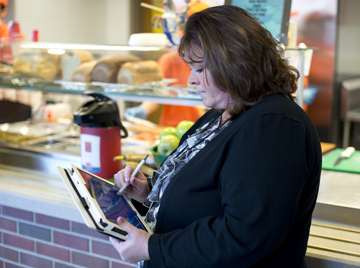Did You Know?: Food inspections at Purdue
March 27, 2014
 |
|
Jennifer Asbury, environmental health technician in Radiological and Environmental Management, conducts health inspections at all food vendors on Purdue's West Lafayette campus, including those at fraternities, sororities and cooperative houses. She also inspects vendors at Purdue Calumet, Purdue North Central and Indiana University-Purdue University Fort Wayne. (Purdue University photo/Mark Simons) |
Purdue's food vendors -- including temporary and seasonal ones -- undergo strenuous inspections to ensure that their products and practices are as safe as possible for consumers.
Jennifer Asbury, environmental health technician in Radiological and Environmental Management, conducts all inspections. She inspects food vendors on Purdue's West Lafayette campus, including those at fraternities, sororities and cooperative houses. She also inspects vendors at Purdue Calumet, Purdue North Central and Indiana University-Purdue University Fort Wayne.
In all, more than 150 food vendors are subject to inspection. Permanent establishments are inspected twice yearly and temporary or seasonal establishments -- including vendors at Ross-Ade Stadium, for example -- are inspected annually.
Asbury says Purdue's food vendors are remarkably easy to work with and prioritize consumers' health.
"When we're talking about food and public safety, it's extremely important to be proactive, and our vendors understand that," Asbury says.
Asbury conducts all of her inspections in person and at random. During each inspection, she observes practices and asks workers a long series of questions.
There are 20 categories of questions, including whether workers are knowledgeable about foodborne-illness prevention, whether they practice good hygiene habits, whether their physical facilities meet certain safety requirements and whether their cooking practices are safe.
Violations fall into one of two categories. Non-critical violations require prompt correction of the problem and follow-up contact with Asbury. Critical violations, meaning anything that might cause illness in customers, require immediate corrective action -- or, in severe cases, a temporary shutdown until correction can take place.
The questionnaire Asbury uses is the same as the one state inspectors use. In fact, because Purdue has a memorandum of understanding with the Indiana State Department of Health, Asbury has the same authority as a state food inspector.
The data Asbury gathers is included in a database that contains all data from state health inspectors.
Asbury conducts two or three inspections every day. Three times a year, a state health inspector accompanies her on her inspections to make sure her inspection knowledge and strategies are up to date.
Purdue has been conducting health inspections of its food vendors since the 1960s.
Writer: Amanda Hamon Kunz, 49-61325, ahamon@purdue.edu

